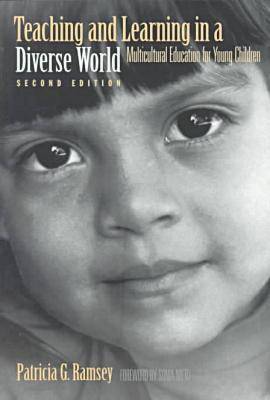Early Childhood Education
1 primary work • 3 total works
Book 93
This second edition of the "classic" text retains its original focus on children's understanding of race, socioeconomic class, culture and gender, while also expanding the definition and scope of multicultural education. The author introduces new themes into multiculturalism by showing us how environmental exploitation and consumerism are related to social inequities and by demonstrating how a respect for the natural world can and must be woven into early childhood education. Citing classroom experiences and personal anecdotes, this volume shows us - often quite humorously - that the road to raising and teaching children with multicultural perspectives may not be an easy one, but it is one filled with hope and joy. The final chapter is written as a story - a vision of how individuals and institutions can change and create a more caring and just world. This book provides practical suggestions and examples of how to incorporate a multicultural perspective in all of our day-to-day interactions with children - from making up classroom rules to planning field trips. There is also a valuable appendix of "Suggested Books for Children".
Leading Anti-Bias Early Childhood Programs
by Louise Derman-Sparks, Debbie LeeKeenan, and John Nimmo
Published 1 January 2015
With a focus on the leader's role in initiating and sustaining anti-bias education in programs for young children and their families, this book is both a stand-alone text and a perfect companion for Anti-Bias Education for Young Children and Ourselves. It emphasizes that this work is not only about changing curriculum, but requires thoughtful, strategic, long-term planning that addresses all components of an early childhood program. With a powerful combination of conceptual frameworks, strategies, and practical tools, Louise Derman-Sparks, renowned expert on anti-bias education, together with experienced early childhood directors Debbie LeeKeenan and John Nimmo explain the structural and individual changes leaders must foster. Featuring the authors' extensive experience in the field, supplemented with insights from other anti-bias educators, they build on and expand current thinking about best early childhood leadership practices. This is an essential resource for anti-bias education leaders engaged in change in the wide range of early childhood care and education settings.
What If All the Kids Are White?
by Louise Derman-Sparks and Patricia G. Ramsey
Published 1 June 2003
In this compelling volume, distinguished educators tackle a frequently asked question about multicultural education: How do I teach about racial and cultural diversity if all my students are white? The authors propose seven learning themes to help young white children resist messages of racism and build identity and skills for thriving in a multicultural country and world. The text includes strategies, resources, and classroom examples for implementing the learning themes in early childhood settings.
Taking multicultural education to a new level, this practical guide: places the development of white children's racial identity in the context of the historical construction of "whiteness" and racism in America; suggests strategies for nurturing a new white identity as the starting place for antibias/multicultural work with children; offers ways to expand children's interests and concerns beyond their immediate world to instill a sense of caring and connection toward people different from them and to encourage seeing themselves as agents of change; and includes activities for families and staff, reflection questions, a review of white anti-racism activists, lists of suggested children's books, and organizational and website resources.
Taking multicultural education to a new level, this practical guide: places the development of white children's racial identity in the context of the historical construction of "whiteness" and racism in America; suggests strategies for nurturing a new white identity as the starting place for antibias/multicultural work with children; offers ways to expand children's interests and concerns beyond their immediate world to instill a sense of caring and connection toward people different from them and to encourage seeing themselves as agents of change; and includes activities for families and staff, reflection questions, a review of white anti-racism activists, lists of suggested children's books, and organizational and website resources.

